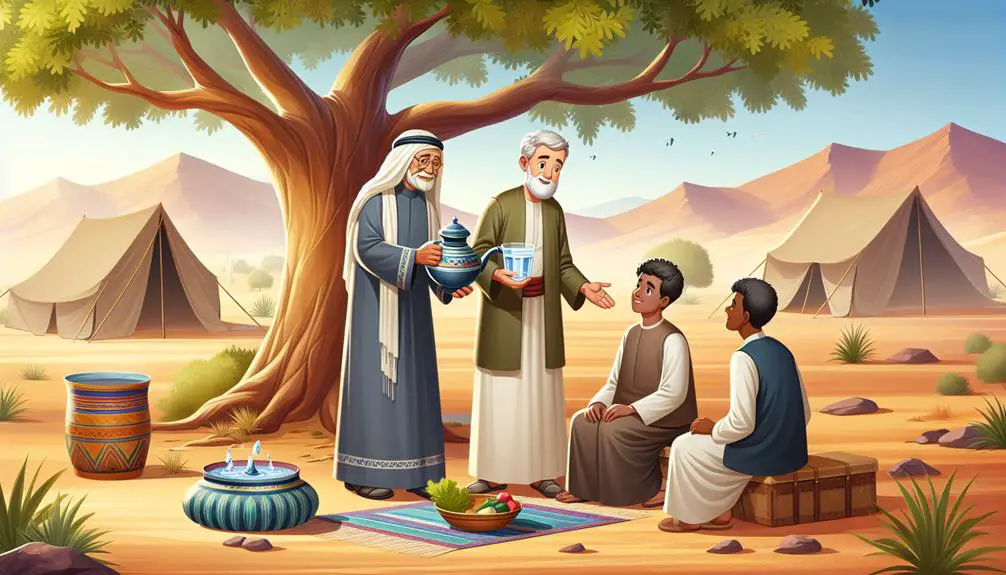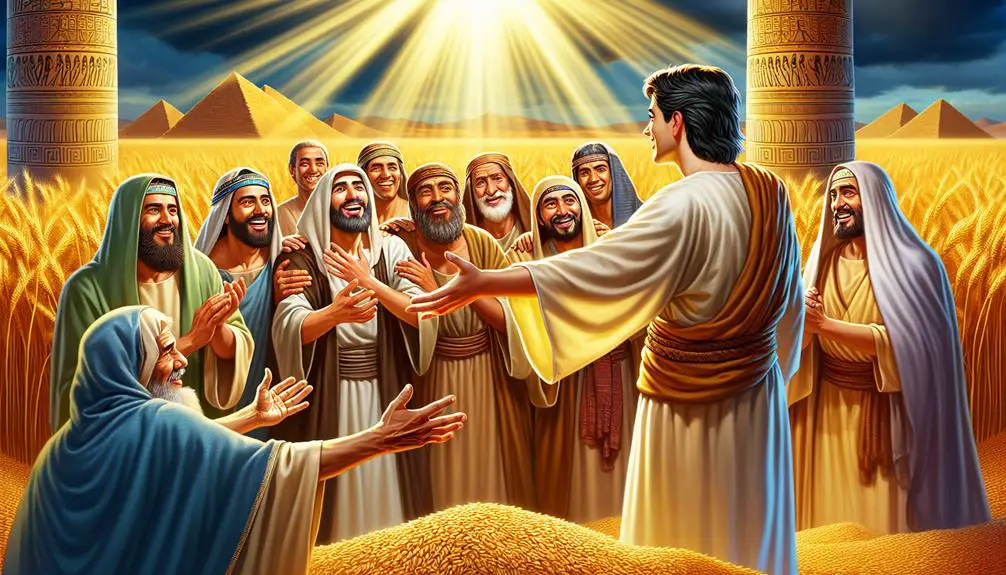Navigate through the Bible's lesser-known tales of kindness, uncovering ancient lessons on compassion that still echo in today's world.

Examples of Kindness in the Bible
You might be surprised to learn that the Bible is brimming with stories of kindness, extending far beyond the well-known parables and miracles. From the compassion of the Good Samaritan to Abraham's generous hospitality, these narratives offer profound lessons on empathy and generosity.
Yet, the depth of kindness depicted in these stories, such as Joseph's forgiveness of his brothers or Boaz's benevolence towards Ruth, reveals a multifaceted understanding of human compassion that still resonates today.
As we explore these examples, consider how they might inspire acts of kindness in your own life, in ways you've perhaps not yet imagined.
Key Takeaways
- The Good Samaritan teaches that true kindness transcends societal boundaries and prejudices.
- Abraham's hospitality emphasizes the importance of treating all people with respect and generosity.
- Joseph's forgiveness of his brothers highlights the healing power of kindness and reconciliation in family relationships.
- Jesus' healing of the sick demonstrates divine compassion and sets a precedent for kindness as a core tenet of faith.
The Good Samaritan

One of the most compelling illustrations of kindness in the Bible is the parable of the Good Samaritan, which exemplifies how compassion transcends societal boundaries. Delving into the cultural context, you'll uncover that the Samaritans and Jews of that era harbored deep-seated animosities towards each other. This backdrop makes the Samaritan's act of kindness not just a simple deed but a radical act of love that challenges societal norms and prejudices.
Analyzing this parable, you grasp its modern implications, revealing how its lessons are timeless. In today's global village, where divisions run deep across lines of race, religion, and nationality, the Good Samaritan's story urges you to act with compassion towards all, regardless of societal divisions. It's a call to dismantle the invisible barriers we've erected around our hearts and communities.
Thus, the Good Samaritan isn't just a biblical narrative; it's a blueprint for how to navigate a world rife with divisions. It teaches you that true kindness is universal and knows no boundaries, challenging you to extend a helping hand to anyone in need, irrespective of their background or beliefs.
Abraham's Hospitality

Shifting focus from the Good Samaritan's universal compassion, we encounter Abraham's exceptional display of hospitality in the Bible, which offers another profound lesson in kindness. This narrative not only reflects Abraham's individual character but also embodies the broader cultural norms of desert generosity, where travelers often depend on the kindness of strangers for survival.
Abraham's swift action to welcome three strangers with open arms, providing them with water, rest, and a lavish meal, serves as a striking example of unconditional hospitality. His readiness to serve, without any initial knowledge of his guests' divine nature, underscores a lesson that transcends time: the importance of treating everyone with respect and kindness, irrespective of their identity or status.
Analyzing this account through a scholarly lens, it's evident that Abraham's actions challenge us to reflect on our own willingness to extend kindness without the expectation of reward. In a world where cultural norms often dictate our actions, Abraham's story prompts a reevaluation of these norms in favor of a more inclusive and generous approach to others. His example not only enriches our understanding of biblical kindness but also invites us to cultivate a similar spirit of hospitality in our own lives.
Joseph Forgives His Brothers

In the biblical narrative, Joseph's decision to forgive his brothers, despite their betrayal, exemplifies a profound act of kindness that challenges us to reconsider our own capacities for forgiveness and reconciliation. Joseph, sold into slavery by his own siblings, rises to power in Egypt, yet when the moment comes to confront his past, he chooses compassion over vengeance. This story isn't just about the act of forgiving but also about the transformative power of kindness in mending fractured relationships.
Here are three key insights to help you appreciate Joseph's story of forgiveness and its implications for family reconciliation and dream interpretation:
- Family Reconciliation: Joseph's forgiveness is a pivotal moment that leads to the healing of deep familial wounds. It reminds us that reconciliation, though complex, is possible with empathy and understanding.
- Dream Interpretation: Joseph's ability to interpret dreams not only elevates his status in Egypt but also becomes a means through which he reconnects with his family. This aspect highlights the importance of recognizing and utilizing one's gifts for the greater good.
- Emotional Intelligence: Joseph demonstrates remarkable emotional intelligence by managing his feelings towards his brothers and focusing on the bigger picture of family unity and survival. This teaches us the value of perspective in overcoming personal grievances.
Boaz and Ruth

Turning our attention to the story of Boaz and Ruth, we encounter another profound example of kindness that transcends societal norms and personal gain, offering valuable lessons in loyalty, charity, and the importance of protective care within our communities. This narrative showcases Ruth's loyalty to her mother-in-law, Naomi, a loyalty that propels her into the fields of Boaz to glean what the harvesters have left behind.
Boaz's response to Ruth is a vibrant display of harvest generosity. Rather than merely allowing her to glean, he goes a step further, instructing his workers to leave extra grain for her to gather, ensuring her safety among his fields, and even sharing his meal with her. This act of kindness, deeply rooted in the social and religious customs of the time, highlights the significance of going beyond mere duty to act with heartfelt compassion and care.
Analyzing the interaction between Boaz and Ruth, we find a layered exploration of how societal roles and expectations can be transcended through individual acts of kindness. Boaz's actions aren't just about adhering to the letter of the law but embodying its spirit, demonstrating how personal initiatives can significantly impact the well-being of others in society.
Jesus Heals the Sick

You'll find that Jesus' acts of healing the sick serve as profound demonstrations of compassionate miracles, reflecting an unparalleled depth of divine love.
These actions not only underscore his spiritual authority but also embody the tangible expression of kindness and empathy towards humanity's suffering.
Through these miracles, Jesus sets a precedent for the practice of compassion as a core tenet of faith, inviting followers to embrace and enact similar values in their lives.
Compassionate Miracles Performed
Jesus' ministry was marked by a series of compassionate miracles, notably his healing of the sick, which serves as a profound testament to his divine empathy and concern for human suffering. These miracles, beyond their immediate impact, invite deep analysis and interpretation, providing rich material for both spiritual reflection and practical application in contemporary contexts.
- Miracle Interpretations: Scholars and theologians have long debated the symbolic meanings behind these healings, viewing them as metaphors for spiritual renewal and social restoration.
- Modern Applications: These narratives inspire current efforts toward healing and compassion, suggesting that acts of kindness can transcend temporal and physical boundaries.
- Empathy in Action: By examining Jesus' approach, you're encouraged to embody empathy, actively seeking ways to alleviate suffering in your community and beyond, echoing the timeless nature of these compassionate miracles.
Demonstrating Divine Love
Building on the understanding of Jesus' compassionate miracles, it's crucial to explore how his acts of healing the sick not only demonstrated divine love but also redefined the essence of empathy and care in human relationships. By extending his healing hands to those marginalized by society, Jesus exemplified an unparalleled model of loving enemies and showcasing divine mercy.
This profound demonstration wasn't just about physical healing but also about bridging divides, breaking social stigmas, and fostering an inclusive community. His actions challenge you to reassess your approach to empathy, urging a shift from mere sympathy to active, compassionate involvement.
Jesus' methodology underscores the power of divine love as a transformative force, capable of transcending societal barriers and nurturing genuine connections among individuals, irrespective of their backgrounds or standings.
The Widow's Offering

In analyzing the account of the Widow's Offering in the Bible, it becomes evident that small acts of generosity, often overlooked, carry profound spiritual significance. This narrative underscores two key concepts: the generosity principle and sacrificial giving. Unlike the affluent who contributed from their surplus, the widow, in her poverty, offered everything she had. This act of kindness, though seemingly minor, highlights her immense faith and trust in God's provision.
To fully appreciate the depth of this story, consider the following aspects:
- Generosity Principle: The widow's act exemplifies the idea that true generosity isn't measured by the amount given, but by the spirit and sacrifice behind the gift. It's a heart condition, a willingness to give selflessly, reflecting God's own generosity towards humanity.
- Sacrificial Giving: Her offering teaches us the value of sacrificial giving – that giving till it hurts, in a manner that trusts entirely in God's provision, holds incredible worth in God's eyes.
- Spiritual Significance: This story serves as a powerful reminder that in God's kingdom, the metrics of worth and value are vastly different from worldly standards. It's not the magnitude but the motive behind our actions that truly matters.
Through the Widow's Offering, we're invited to reevaluate our own attitudes towards generosity and sacrifice, recognizing that it's the purity of our intentions, not the size of our contributions, that defines our acts of kindness.
Frequently Asked Questions
How Does Kindness in the Bible Relate to Modern-Day Acts of Charity and Volunteerism?**
You're exploring how ancient acts of kindness translate into today's charity and volunteerism. Modern parallels are evident in the seamless integration of social media activism with traditional giving.
This dynamic reflects a foundational principle: kindness transcends time, adapting to societal changes while maintaining its core value. Analyzing this evolution provides insight into the timeless nature of empathy, encouraging a scholarly examination of how these principles continue to shape and inspire contemporary acts of generosity.
Are There Examples of Kindness in the Bible That Demonstrate Kindness to Animals or the Environment?**
Yes, the Bible subtly paints a canvas where animal stewardship and Creation care aren't just encouraged but exemplified.
For instance, Proverbs 12:10 highlights how the righteous treat their animals with kindness, suggesting a deeper, intrinsic value in all of creation.
This perspective invites a scholarly analysis, as it provides a foundational argument for modern environmental ethics and animal welfare, showing that compassion extends beyond human borders to embrace all living beings and the environment.
How Do Biblical Teachings on Kindness Compare to Those in Other Major Religions?**
When you delve into comparative philosophy and engage in interfaith dialogue, you'll find that biblical teachings on kindness share common ground with those in other major religions. Each tradition emphasizes compassion, altruism, and respect for life.
However, nuances in interpretation and practice reveal a rich diversity in understanding kindness. This exploration not only enriches your insight into different faiths but also highlights the universal value of kindness across cultures.
What Role Does Kindness Play in Biblical Teachings About Leadership and Governance?**
You might think that leadership and governance focus solely on power and authority, but actually, kindness plays a crucial role in biblical teachings about these topics.
Leadership isn't just about directing; it's about leading with humility, showing that true leaders serve others with compassion.
In governance, compassion is key to fair and just rule. This approach promotes a leadership style that values empathy and service, deeply rooted in biblical principles.
Can Biblical Examples of Kindness Be Interpreted Differently Across Various Christian Denominations?**
Yes, biblical examples of kindness can be interpreted differently across various Christian denominations. Denominational interpretations often reflect underlying theological beliefs and cultural influences.
As you delve into these examples, you'll find that what's emphasized or how actions are understood can vary significantly. This diversity sheds light on the rich tapestry of Christian thought and demonstrates how cultural contexts and theological nuances influence interpretations of biblical kindness.
Conclusion
In analyzing these biblical narratives, it's evident that kindness acts as the thread binding humanity's moral fabric.
The Good Samaritan and Abraham's hospitality exemplify that 'actions speak louder than words,' transcending societal norms and expectations.
Through Joseph's forgiveness and Boaz's generosity, we witness the transformative power of kindness.
The tales of Jesus' healing and the widow's offering further underscore the profound impact of compassionate acts.
Collectively, these stories not only enrich our understanding of biblical teachings but also challenge us to embody kindness in our daily lives.



Sign up